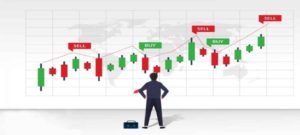मी अनेकदा आवडण्याऐवजी हरवतो का? जेव्हा तुम्ही व्यापाराबद्दल बोलतो तेव्हा, करार किंवा करारांची मालिका चुकीची होऊन व्यापाऱ्याला दुखावण्याची अनेक कारणे असू शकतात. कार्यात्मक घटक अंतर्गत आणि बाह्य विभागलेले आहेत. सामग्री व्यापाऱ्याची मानसिकता, त्यांनी मिळवलेले ज्ञान, त्यांचे अनुभव आणि पद्धती समाविष्ट करू शकते. बाह्य घटक जे व्यापारी नियंत्रित करू शकत नाहीत: बाजार परिस्थिती, मागणी आणि पुरवठा दर, सामान्य अंदाज. आजच्या लेखात, आपण व्यत्ययाची सर्व कारणे पाहू.
अंतर्गत कारणे
किरकोळ विक्रेत्यांद्वारे आयटम सामग्री तयार आणि सुधारली जाऊ शकते. हे पूर्णपणे व्यापारी आणि व्यापार्याच्या त्यांच्या व्यापार धोरणातील त्यांचा प्रभाव दूर करण्याच्या भूमिकेवर अवलंबून असतात.
भावनिक स्थिती. उद्योजकाची मानसिकता खूप महत्त्वाची असते. इतर गोष्टींबरोबरच, एखादी व्यक्ती ज्या परिस्थितीत व्यवसाय चालवते त्यामुळे आपत्तीजनक परिणाम होऊ शकतात. जर एखाद्या व्यावसायिकाला चिंता किंवा राग वाटत असेल तर ते त्यांना त्यांची निवड दर्शवेल. पण मला चुकीचे समजू नका: चांगल्या भावना देखील मदत करत नाहीत. उत्साह, उत्साह आणि गोंधळलेल्या अपेक्षा खूप विनाशकारी असू शकतात.
काही समज नाही. काही व्यापारी, प्रशिक्षणातून पळून जाण्याचा प्रयत्न करत, सहसा रोबोट असतात, तर काही "ट्रेड मॅनेजर" ची मदत घेतात, बहुतेक वेळा घोटाळे करतात. काहीजण नशिबावर अवलंबून असतात आणि काही वेळा कोणतीही तयारी न करता व्यवसाय करतात. खेळ म्हणून व्यापार करण्याची कल्पना तोट्यात संपली पाहिजे हे वेगळे सांगण्याची गरज नाही. इतरांच्या मदतीची वाट पाहणे शुद्ध आहे. व्यावसायिकाने ते काय करत आहेत हे शिकून स्वावलंबी असणे आवश्यक आहे. व्यापार करण्यापूर्वी, चांगली किंवा वाईट मालमत्ता उघडण्यासाठी सर्वोत्तम आणि सर्वात वाईट वेळा शोधणे ही चांगली कल्पना असू शकते. योग्य निवडी बुद्धिमत्तेवर आधारित असू शकतात, नशिबावर नाही.
कोणतेही जोखीम व्यवस्थापन नाही. दुर्दैवाच्या सर्वात कारणांपैकी एक म्हणजे संधी प्रशासनाच्या व्यवस्थेची गरज. व्यापारी त्यांचा व्यवसाय बंद करण्यापूर्वी, अस्थिरतेच्या वापराकडे दुर्लक्ष करून आणि "विशिष्ट वस्तू" च्या एकूण शिल्लक धोक्यात येण्यापूर्वी तोट्याची खोली पाहतात.
उच्च अपेक्षा. अनेक व्यापार्यांचा असा विश्वास आहे की ते भरपूर पैसे कमावतात. म्हणून, ते दुकानात गर्दी करतात आणि रेकॉर्डशिवाय ठेवतात. तथापि, व्यापार बंद हा महत्त्वाचा घटक नसून सकारात्मक आहे. अनावश्यक इच्छा केवळ समस्या निर्माण करतात, म्हणून नम्र असणे आणि शिकणे आणि सराव करणे सुरू ठेवणे चांगले आहे.
बाहेर
व्यापारातील प्रत्येक गोष्ट व्यापाऱ्यापासून स्वतंत्र असते. एक निश्चित धोरण असू शकते जे चांगले कार्य करते आणि नेहमी वेळोवेळी नुकसान करते.
• बाजार लोकांद्वारे चालविला जातो. याचा अर्थ संपत्ती अजूनही वाढत आहे का? याचा अर्थ अधिक लोक खरेदी करत आहेत. अधिक ग्राहक म्हणजे जास्त किंमती आणि मालमत्ता जलद वाढू शकते. पण खूप वेळ आहे, अनेकांना जास्त किंमतीला खरेदी करायची आहे आणि त्यांना वाटेल की त्यांना ते आधीच मिळाले आहे, या आशेने की किंमत कमी होईल. ते विकणे निवडू शकतात. जितके लोक विकतील तितकी जमिनीची किंमत कमी आणि किंमत कमी.
हे एक अतिशय सामान्य विधान आहे, परंतु हे दर्शवते की सार्वजनिक मनाचा बाजारावर कसा परिणाम होतो आणि हा नमुना व्यावसायिक ग्राहकांवर अवलंबून नाही. गर्दीतून बाहेर पडणे आणि इतर लोकांच्या मतांवर प्रभाव न पडणे कठीण आहे, परंतु मार्केटर्सनी बाजाराचे मूल्यमापन करणे आणि स्वत: साठी विचार करणे शिकणे आवश्यक आहे.
निष्कर्ष
गहाळ विक्रम मोडण्यासाठी, व्यापाऱ्याने त्वरीत आणि विश्वासार्हपणे कार्य करण्यास तयार असणे आवश्यक आहे. बाजार जाणून घेणे आणि ते व्यापार करत असलेल्या मालमत्तेचा अभ्यास करणे महत्त्वाचे आहे. जोखीम व्यवस्थापन योजना योग्य आणि आध्यात्मिक पद्धतीने राखली गेली पाहिजे. हानीतून बरे होणे त्रासदायक असू शकते, परंतु दुर्दैव हा बंद झालेल्या एक्सचेंजचा एक अटळ भाग आहे. तुम्ही ते कसे हाताळता आणि ते सोडवण्यासाठी तुम्ही काय करता हे महत्त्वाचे आहे.




